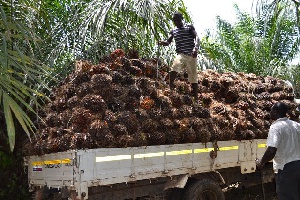Oil Palm farmers in Tarkwa and surrounding areas have hailed the contributions of Solidaridad to the boosting of their yields and for the renewed interest in the cultivation of the crop.
Solidaridad West Africa, not-for-profit organisation that supports the sustainable development of farmers and production systems, started providing technical support to farmers in Tarkwa and surrounding areas in the Western Region, about two years ago.
“Two years ago, I almost sold my farm because of poor yields,” Mr Kwame Adentwi of Obeyeyie farms told the GNA on his farm after an outreach programme.
“But I changed my mind when I attended a course in Cape Coast organised by Solidaridad. I’ve never regretted doing so because now I am making good money,” he added.
Mr Adentwi said the surprising element in all the support that Solidaridad provides is that it is free of charge to the farmer.
The support, which is under the Sustainable West Africa Oil Palm Programme (SWAPP), is funded by the Dutch Government.
SWAPP’s goal is to increase the productivity and profitability of small and medium scale enterprises with the programme expected to reach more than 1,000 small holder farmers within two years.
The two-year programme is to enable farmers to adopt best agronomic and management practices to boost production to meet the huge demand for oil palm.
The programme is also targeted at the youth to entice them to see the oil palm sector as a productive venture for a life time business.
Farmers are taught best management practices which include ground cover, pest, canopy, rotational and soil managements, among others and through these, most farmers had increased their yields.
Findings from SWAPP’s studies of best management practices of oil palm farms have shown that simple agronomic practices of pruning, weeding, creation of paths and regular harvesting of fruits at a 10- day interval increases farmer’s yield by more than 60 per cent.
Tuffour Quaicoe, a 37- year- old farmer who has four hectares under cultivation, said the adherence to best practices, such as fertiliser application and harvesting times had helped him increase the yield on his farm to 19.4 tonnes from 9.5 tonnes per hectare.
“My advice to farmers is to adopt the methods being taught them. I know they will reap from it,” he said.
Mr Yusif Aidoo-Mensah, Chairman Tarkwa Area Oil Palm Farmers Association, which groups 52 farmers cultivating more than 270 hectares, said Solidaridad entry and intervention to farmers in the area was God sent.
“We’ve all lost hope in the cultivation of the crop as yields were falling from year to year. But their interventions have helped to restore lost hopes,” he said.
“With the adoption of the best management practices, I’ve seen my yield per hectare increase to 13 tonnes per hectare from a low of 2.5 tonnes per hectare. My hope is that every farmer should benefit,” Mr Aidoo-Mensah added.
Ms Kosi Yankey, Agri-business Incubator Specialist, who spoke on the SWAPP incubator and access to finance component, said it is open to oil palm farmers, mill operators, and input supplies through a transparent and competitive selection criterion.
She said the main aim of the incubator and finance programme is to encourage more capital to flow into the sector by the risk capital investments, improving expected returns and raising awareness.
Ms Yankey said through the SWAPP Incubator and Access to Finance farmers are provided financial support to enhance growth of their businesses at a minimal interest rate.
She said the funds are available to support fertiliser procurement, yield restoration, farm expansion and acquisition of equipment.
Ms Yankey said the support is a revolving fund and must be paid within 15 months so that other farmers could also benefit from it.
Rosemary Addico, Oil Palm Programme Manager Ghana, Solidaridad West Africa, said once farmers began to reap the benefits from the best management practices, the sector would become interesting to financial institutions to provide the necessary funding, which is a major handicap to most farmers.
Regional News of Monday, 25 May 2015
Source: GNA

















